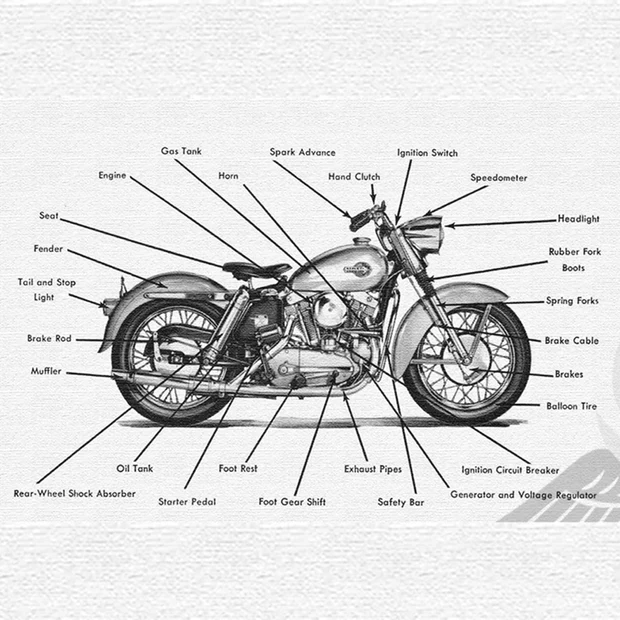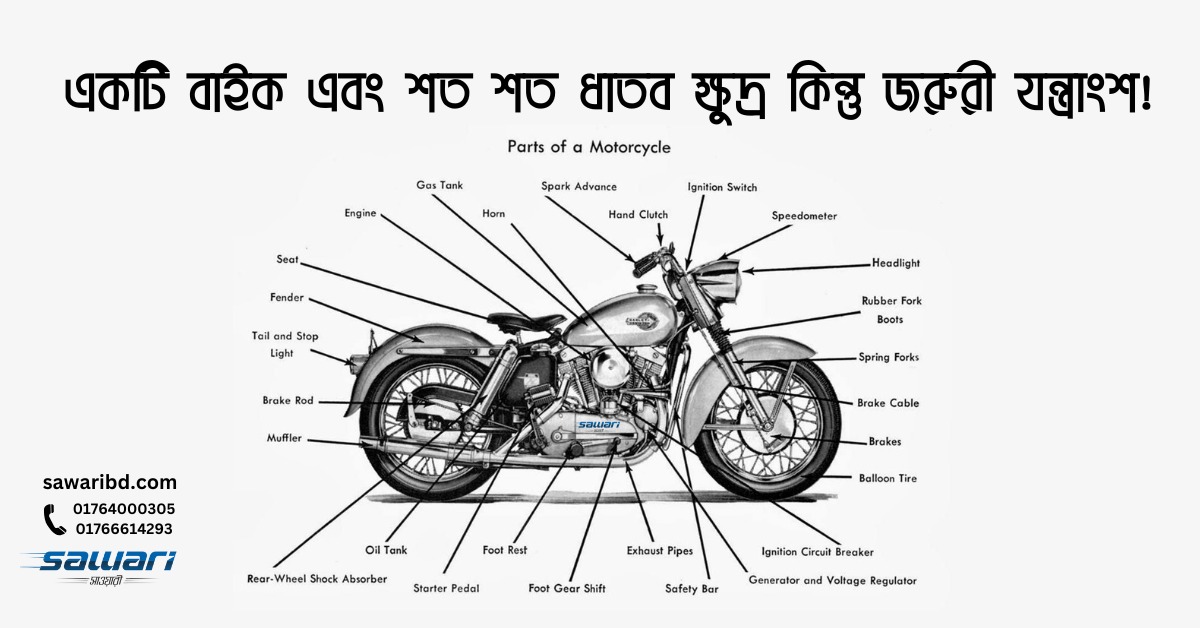Top 5 Motorcycle Parts Auckland for Riders in NZ
Top 5 Motorcycle Parts Auckland for Riders in NZ
Blog Article
Discover the Necessary Motorcycle Components You Required for Optimal Efficiency
Understanding the essential parts of a bike is fundamental for achieving peak performance. Each component, from the engine to the braking system, plays an important function in overall capability and security. Routine upkeep can prevent unanticipated failures and improve the riding experience. Numerous riders forget the intricacies of these systems. Finding how they collaborate can result in a much more reliable trip. What important elements should every cyclist prioritize?
The Engine: The Heart of Your Motorcycle
The engine works as the core element of a bike, driving its efficiency and defining its abilities. It is accountable for transforming fuel into power, which powers the bike forward. Different kinds of engines are employed, including single-cylinder, V-twin, and inline setups, each offering unique attributes suited for various riding objectives and designs. The engine size, normally gauged in cubic centimeters (cc), substantially influences efficiency, with bigger engines usually offering even more power and torque.Furthermore, the engine's style and innovation, such as gas shot systems or air-cooling versus liquid-cooling, affect effectiveness and reliability. Upkeep is essential for peak operation; aspects like regular oil adjustments and monitoring ignition system warranty long life. Riders typically consider an engine's responsiveness and level of smoothness, as these features enhance the overall riding experience. Eventually, the engine continues to be a critical element that defines not just the bike's performance but likewise the rider's link to the machine.
The Transmission: Shifting Gears Efficiently
The transmission plays a vital function in a motorbike's efficiency, particularly in the technicians of gear changing. Recognizing how to shift equipments efficiently can improve the overall riding experience, while routine upkeep assurances peak performance. Appropriate interest to these aspects can substantially affect the longevity and efficiency of the bike.

Gear Shifting Mechanics
Smooth equipment shifting is important for suitable motorbike performance, substantially impacting both acceleration and control. The technicians of equipment shifting include the communication between the clutch, gear bar, and transmission system. When a biker engages the clutch, it disengages the engine from the transmission, permitting an equipment change without harming the parts. A well-timed release of the clutch, integrated with specific activity of the gear bar, promotes a seamless modification between gears. This procedure ensures that the engine operates within its finest power band, boosting performance. Motorcycle Spares Christchurch. Additionally, comprehending the gear ratios and their effect on speed and torque can aid cyclists make notified choices during shifts, ultimately adding to a more receptive and delightful riding experience
Maintenance Tips Relevance
Routine maintenance plays an essential role in ensuring that the transmission system operates efficiently, permitting for smooth equipment shifts. Routinely examining and altering the transmission fluid is crucial, as old liquid can cause raised rubbing and wear. Furthermore, examining the clutch for wear guarantees peak engagement and disengagement, preventing slippage throughout gear changes. Lubrication of relocating components is similarly important to lower rubbing and boost performance. Motorcycle owners ought to also monitor for leakages and unusual noises, as these can suggest underlying concerns. By adhering to these upkeep ideas, cyclists can prolong the lifespan of their transmission system, ensuring that gear changes stay smooth and adding to the general performance of their motorbike.
The Braking System: Ensuring Security on Every Trip
Braking systems are essential elements that straight affect a motorcycle's safety and security and performance. They include various components, including brake pads, blades, calipers, and hydraulic lines, all collaborating to guarantee effective slowdown. The type of stopping system-- usually either disc or drum-- impacts responsiveness and quiting power.Regular upkeep is vital to maintain peak performance; worn brake pads can cause reduced effectiveness and enhanced stopping distances. Furthermore, the quality of brake fluid need to be kept an eye on, as it can soak up dampness over time, jeopardizing stopping efficiency.Riders ought to likewise consider the importance of anti-lock stopping systems (ABS), which avoid wheel lockup throughout sudden stops, improving overall safety. Correctly operating brakes are not almost stopping; they impart self-confidence in the motorcyclist, enabling for more secure navigating via numerous surfaces. Eventually, a reputable braking system is important for enjoying every trip with tranquility of mind.
The Suspension: Enhancing Comfort and Control
A well-functioning shock absorber considerably adds to a motorbike's general performance, complementing the efficiency of the stopping system. The suspension plays a considerable role in soaking up shocks from uneven surface areas, ensuring a smoother adventure while maintaining tire contact with the roadway. This get in touch with is important for both security and control, enabling cyclists to browse corners with self-confidence and precision.Different types of shock absorber, such as telescopic forks or mono-shocks, offer differing degrees of convenience and handling. Effectively tuned suspension enhances responsiveness, supplying the cyclist with a more linked feel to the motorbike. Regular maintenance checks are necessary to ascertain the suspension elements, consisting of springtimes and dampers, are operating at their finest. An effective suspension system not just raises the riding experience yet also contributes to the durability of other motorbike components by minimizing wear and tear. Consequently, buying top quality suspension is essential for any kind of severe motorcycle lover.
The Tires: Connecting You to the Roadway
Tires play an important this contact form role in a motorcycle's performance, acting as the main web link between the motorcyclist and the road. Understanding the various kinds of tires offered can substantially impact managing and safety. Furthermore, normal upkeep is important to ensure peak tire efficiency and longevity.
Tire Types Explained
Exactly how do various tire kinds affect a motorcycle's efficiency? Tire types play an essential function in establishing a motorbike's stability, hold, and handling. Sport tires, designed for high performance, offer improved traction and responsiveness on paved roads, making them suitable for competing and aggressive riding. Conversely, touring tires prioritize longevity and comfort, providing a smoother trip for long-distance travel. Off-road tires, defined by their tough walk patterns, master grip on unpaved surface areas, ideal for journey fanatics. In addition, dual-sport tires mix features from both off-road and on-road groups, accommodating functional riding demands. Inevitably, picking the appropriate tire kind is crucial for maximizing efficiency, making sure security, and improving the overall riding experience.
Maintenance Tips Offered
While riding when driving, keeping excellent tire problem is crucial for security and performance. Consistently examining tire stress is crucial, as under-inflated tires can bring about poor handling and enhanced wear. It is recommended to inspect step depth frequently; used tires concession hold and stability. Additionally, motorcyclists ought to look for indicators of damage, such as splits or lumps, which can indicate the demand for replacement. Revolving tires regularly guarantees also wear, improving longevity. Keeping tires tidy from particles and avoiding too much curbs can extend their lifespan. Maintaining appropriate placement and balance contributes to peak performance, lessening stress on other bike components. Following these upkeep suggestions will considerably enhance the general riding experience.
The Gas System: Sustaining Efficiency and Efficiency
The fuel system plays a vital role in making best use of a motorbike's performance and effectiveness, as it assures the optimum delivery of fuel to the engine. It makes up a number of essential components, including the fuel tank, fuel pump, fuel filter, and gas injectors or carburetor. Each component has to operate effectively to ensure a smooth and effective ride.The gas storage tank shops fuel and provides it to the engine using the gas pump, which creates the necessary stress. A gas filter prevents contaminants from entering the engine, while the injectors or carburetor mix gas with air for combustion.Proper upkeep of the gas system is critical; a clogged filter or malfunctioning injector can lead to decreased performance and increased gas intake. By validating that the gas system runs effectively, motorcyclists can appreciate better throttle response, much better fuel economic climate, and in general improved riding experience.
The Electrical System: Powering Your Trip
An efficient electric system is crucial for the total capability and security of a motorbike, as it powers crucial components such as the ignition, lighting, and numerous electronic systems. This system includes the battery, this which shops energy, and the alternator, in charge of creating power while the engine runs. The electrical wiring harness connects these parts, making certain trustworthy power distribution.Additionally, merges protect the system from overloads, while relays aid manage high-current devices with low-power signals. A properly maintained electrical system enhances efficiency by guaranteeing smooth beginnings and constant procedure of lights and signals, vital for cyclist exposure and safety.Regular checks of the battery's cost and connections are necessary for avoiding electrical failings. Riders must likewise evaluate electrical wiring for damage, making certain all parts operate ideally. Eventually, a robust electrical system contributes significantly to the overall efficiency and integrity of the motorbike.
Regularly Asked Questions
Exactly how Frequently Should I Change My Bike's Battery?
The frequency of bike battery substitute depends on use and upkeep (Motorcycle Parts Auckland). Normally, batteries need to be replaced every three to five years. Normal checks can aid identify when a replacement is needed for peak performance
What Tools Do I Need for Fundamental Bike Upkeep?
For basic motorbike upkeep, one calls for essential tools such as a socket set, wrenches, screwdrivers, pliers, tire stress scale, and a torque wrench. These devices promote effective upkeep and ensure the motorbike runs effectively and securely.
Just How Can I Boost My Bike's The rules of aerodynamics?
To boost motorcycle aerodynamics, one should consider changing fairings, using windscreen extensions, enhancing body setting, and minimizing general weight. These adjustments aid lessen drag, boosting security and gas efficiency during trips.
What Are the Signs of a Failing Electrical System?
Signs of a failing electric system consist of dimming lights, problem starting, uneven tool analyses, and blown merges. Oem Parts New Zealand. Uncommon smells or corrosion around battery terminals might additionally suggest underlying problems requiring prompt interest for safety and efficiency

How Do I Choose the Right Oil for My Bike?
When picking oil for a motorbike, one ought to consider the manufacturer's requirements, thickness scores, and the kind of riding. Additionally, standard versus synthetic oil can influence efficiency and engine advice security, affecting the choice significantly. The engine size, typically gauged in cubic centimeters (cc), significantly influences efficiency, with larger engines generally giving more power and torque.Furthermore, the engine's layout and innovation, such as gas shot systems or air-cooling versus liquid-cooling, impact efficiency and dependability. A well-functioning suspension system greatly adds to a motorcycle's general performance, complementing the effectiveness of the braking system. The fuel system plays an important function in taking full advantage of a motorbike's efficiency and performance, as it ensures the optimum shipment of gas to the engine. A fuel filter protects against pollutants from getting in the engine, while the injectors or carburetor mix fuel with air for combustion.Proper upkeep of the gas system is important; a clogged filter or malfunctioning injector can lead to reduced efficiency and increased gas intake. A well-kept electric system enhances performance by making sure smooth starts and constant procedure of signals and lights, important for motorcyclist presence and safety.Regular checks of the battery's charge and connections are crucial for preventing electrical failures.
Report this page